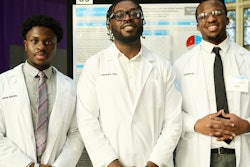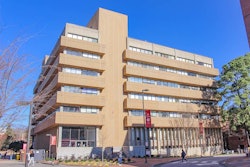GREENVILLE, N.C. — During the week, personal trainer Haywood Parker preaches physical fitness. In Sunday sermons, Bishop Haywood Parker doesn’t change that message.
“Obesity is plaguing America like never before,” says Parker, senior pastor of Truth Tabernacle Ministries. “This is a cultural issue, and the church has an obligation to respond to the issue.”
One way Parker’s church has sought to respond is through participating in the Prosper Project, a three-county initiative conducted by the Department of Public Health at East Carolina University’s Brody School of Medicine. The project, launched in the summer of 2010, aims to wage a spiritual as well as a physical battle against diabetes and cardiovascular disease.
More than 500 members of a dozen primarily Black churches in Edgecombe, Duplin and Lenoir counties have been involved in Prosper, an acronym for “Preparing Ourselves for Spiritual and Physical Enrichment and Renewal.”
“To make a connection with people, it’s effective to work through their churches with people they know,” said Dr. Lloyd Novick, chairman of Brody’s department of public health and co-principal investigator of the project. “We believe that we’re going to be able to demonstrate that a faith-based project like this, working from churches, actually can be successful in impacting on these individuals’ health.”
Participants in the six-month project attend three sessions each month during which they weigh in and have their blood pressure and blood sugar levels checked. Groups meet at the church not only to learn about nutrition, physical activity and overall wellness but to study Bible passages pertaining to health. (The project’s motto comes from 3 John 1:2 “Beloved, I pray that in all respects you may prosper and be in good health, just as your soul prospers.”)
“Eastern North Carolina is known as the stroke belt but also the Bible belt, says Nancy Little, a clinical associate professor in the department of public health and co-principal investigator of the project. “We go to where the people are.
“The church is more than just a place to come on Sunday and on Wednesday night,” she says. “In the minority community, the church is really a consistent place where you spend a lot of time and an integral part of your life.”
Theodore Thomas was practically raised in the church. Growing up with a father as a pastor, Thomas remembers being at church not just for worship on Sundays, but for meals as well.
“Growing up we used to eat at the church all the time,” says Thomas, now a dentist and pastor of First Baptist Church. “They did a lot of cooking at the church, and the cooking they did through the years was they fried a lot and they ate a lot of fatty foods.”
The Prosper Project employs a registered dietitian and a nutritionist to show participants how to find new menu options and how to prepare old favorites with less fat and sodium.
Kathy Flowers, whose husband, John, is pastor of Greater Mount Zion Missionary Baptist Church, says she has seen lower-calorie foods at church dinners since the church began participating in the Prosper Project.
“Whenever we have gatherings now, I notice that our food menu has changed,” says Flowers, who serves as a lay-health adviser for the project, funded by the Kate B. Reynolds Charitable Trust and the North Carolina Health and Wellness Trust Fund.
“We have a lot more vegetables; they’re getting away from the big meal.”
Since the church began Prosper, Flowers says her husband’s blood pressure has been lower. One participant has lost 40 pounds.
Thomas, who lost nearly 70 pounds after being diagnosed as borderline diabetic several years ago, is trying to encourage his congregation to do the same.
“I know it’s hard to lose weight,” he says. “I’ve been through that; I was almost 300 pounds. A lot of times we want to give up. That’s just a lack of faith. God wants us to lead a healthy life.”
Faith has been linked to a number of positive health factors, including lower rates of tobacco and alcohol use. But a study released this spring indicated that young adults who regularly attend religious activities are more prone to obesity in middle age than their nonreligious peers.
While Little points out that “there are plenty of Christians who aren’t fat,” she acknowledges that some churches have been hesitant to discuss their congregation’s diets.
“Eating has been one of the more ‘pardonable’ sins than others,” she says. “But it is killing our communities.”
The Bible cautions against gluttony. Readers of Proverbs are warned against the vice at least three times. Chapter 23, verse 20 reads, “Do not join those who drink too much wine or gorge themselves on meat.”
“The Bible says this (body) is God’s temple,” Thomas says. “Sometimes we get a little lax in taking care of our temple.”
Parker has been interested in health maintenance since college. But 15 years ago, he stepped it up a notch, becoming a certified aerobics instructor and personal trainer at the local YMCA. Now, in addition to pastoring Truth Tabernacle, he teaches as many as eight classes a week in step aerobics, kick boxing, Pilates, cycling and weight training.
When he and his wife heard of the Prosper Project, they thought it would complement the emphasis that the church already had begun to place on health.
“We might be spiritual; we might love Jesus, but are we also healthy?” Parker asks. “That’s part of the foundation of the Prosper Project.
“Now people are starting to rethink what they do,” he said. “It’s late, but it’s good that the church is rethinking.”


















